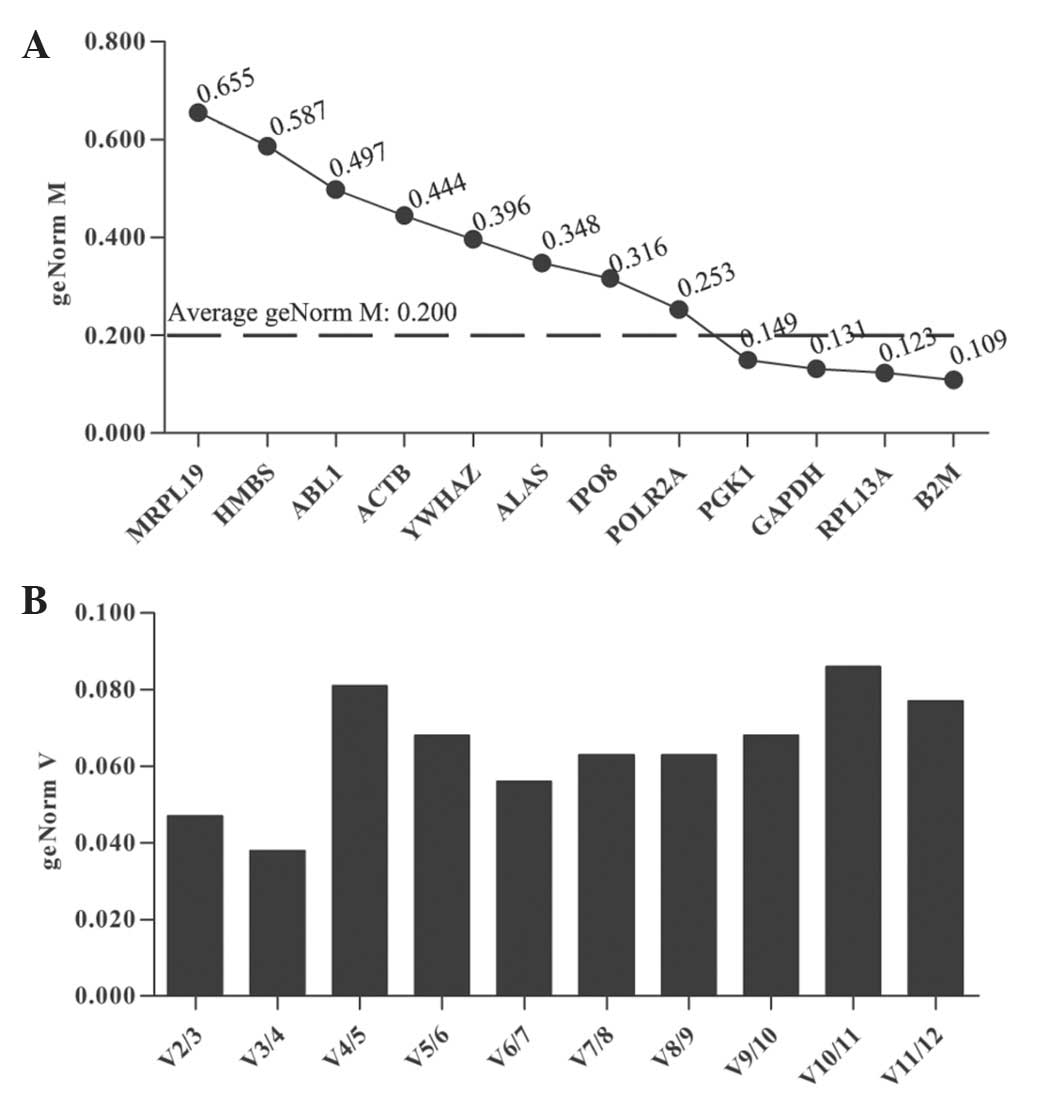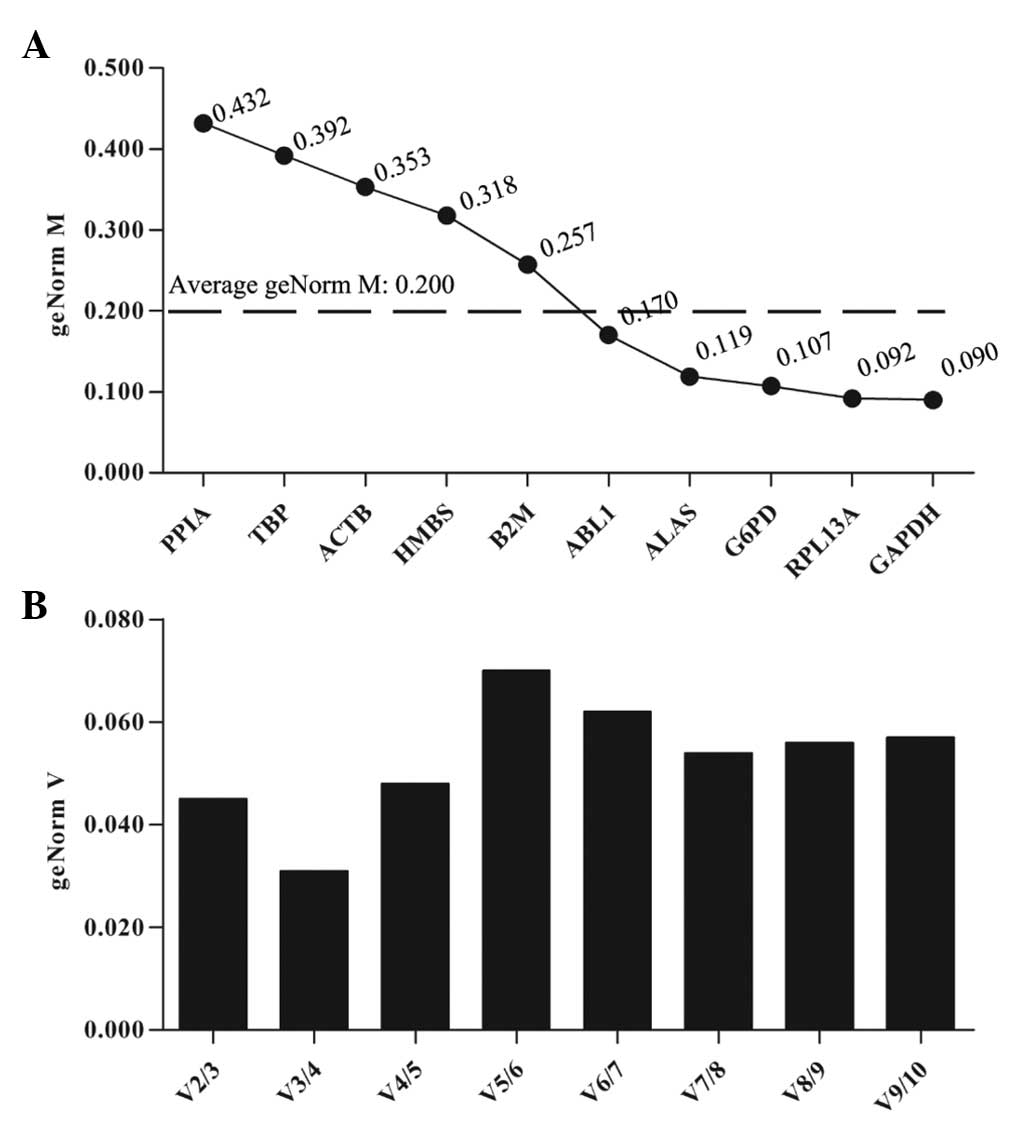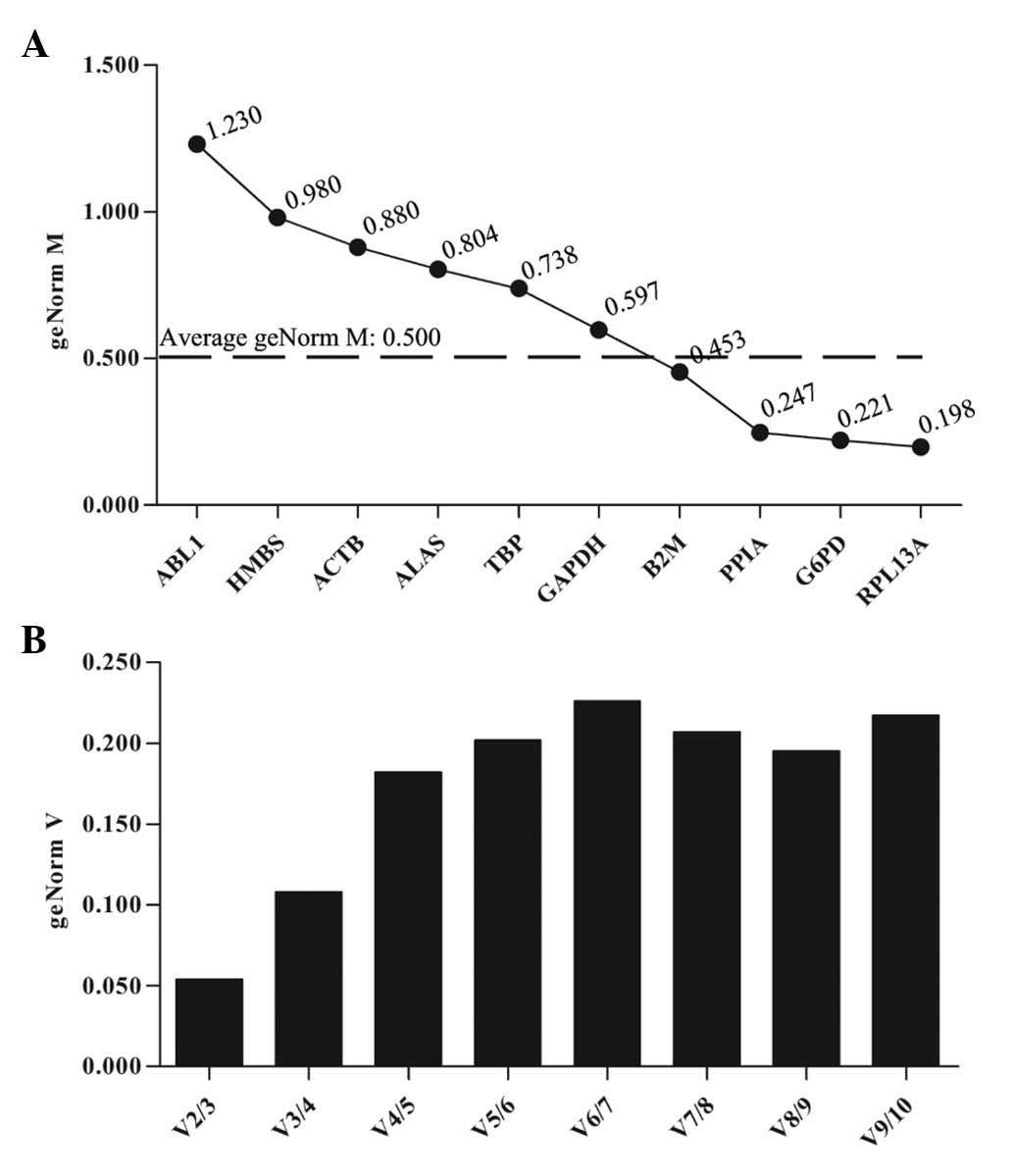|
1
|
Pal S, Gupta R and Davuluri RV:
Alternative transcription and alternative splicing in cancer.
Pharmacol Ther. 136:283–294. 2012. View Article : Google Scholar : PubMed/NCBI
|
|
2
|
Richardson A and Kaye SB: Drug resistance
in ovarian cancer: the emerging importance of gene transcription
and spatio-temporal regulation resistance. Drug Resist Updat.
8:311–321. 2005. View Article : Google Scholar : PubMed/NCBI
|
|
3
|
Lin Y, Zhang C, Lan H, Gao S, et al:
Validation of potential reference genes for qPCR in maize across
abiotic stresses, hormone treatments, and tissue types. PLoS One.
9:e954452014. View Article : Google Scholar : PubMed/NCBI
|
|
4
|
Schmittgen TD and Zakrajsek BA: Effect of
experimental treatment on housekeeping gene expression: validation
by real-time, quantitative RT-PCR. J Biochem Biophys Methods.
46:69–81. 2000. View Article : Google Scholar : PubMed/NCBI
|
|
5
|
Caradec J, Sirab N, Keumeugni C, et al:
‘Desperate house genes’: the dramatic example of hypoxia. Br J
Cancer. 102:1037–1043. 2010. View Article : Google Scholar : PubMed/NCBI
|
|
6
|
Dheda K, Huggett JF, Chang JS, et al: The
implications of using an inappropriate reference gene for real-time
reverse transcription PCR data normalization. Anal Biochem.
344:141–143. 2005. View Article : Google Scholar : PubMed/NCBI
|
|
7
|
Montana M, Ducros C, Verhaeghe P, Terme T,
Vanelle P and Rathelot P: Albumin-bound paclitaxel: the benefit of
this new formulation in the treatment of various cancers. J
Chemother. 23:59–66. 2011. View Article : Google Scholar : PubMed/NCBI
|
|
8
|
Wang N, Zhang H, Yao Q, Wang Y, Dai S and
Yang X: TGFBI promoter hypermethylation correlating with paclitaxel
chemoresistance in ovarian cancer. J Exp Clin Cancer Res. 31:62012.
View Article : Google Scholar : PubMed/NCBI
|
|
9
|
Socinski MA, Okamoto I, Hon JK, et al:
Safety and efficacy analysis by histology of weekly nab-paclitaxel
in combination with carboplatin as first-line therapy in patients
with advanced non-small-cell lung cancer. Ann Oncol. 24:2390–2396.
2013. View Article : Google Scholar : PubMed/NCBI
|
|
10
|
Amos LA and Löwe J: How Taxol stabilises
microtubule structure. Chem Biol. 6:R65–R69. 1999. View Article : Google Scholar : PubMed/NCBI
|
|
11
|
Ferlini C, Cicchillitti L, Raspaglio G, et
al: Paclitaxel directly binds to Bcl-2 and functionally mimics
activity of Nur77. Cancer Res. 69:6906–6914. 2009. View Article : Google Scholar : PubMed/NCBI
|
|
12
|
Ping YH, Lee HC, Lee JY, et al: Anticancer
effects of low-dose 10-hydroxycamptothecin in human colon cancer.
Oncol Rep. 15:1273–1279. 2006.PubMed/NCBI
|
|
13
|
Zhang XW, Qing C and Xu B: Apoptosis
induction and cell cycle perturbation in human hepatoma hep G2
cells by 10-hydroxycamptothecin. Anticancer Drugs. 10:569–576.
1999. View Article : Google Scholar
|
|
14
|
Lesueur-Ginot L, Demarquay D, Kiss R, et
al: Homocamptothecin, an E-ring modified camptothecin with enhanced
lactone stability, retains topoisomerase I-targeted activity and
antitumor properties. Cancer Res. 59:2939–2943. 1999.PubMed/NCBI
|
|
15
|
Shoji T, Takatori E, Kaido Y, et al: A
phase I study of irinotecan and pegylated liposomal doxorubicin in
recurrent ovarian cancer (Tohoku Gynecologic Cancer Unit 104
study). Cancer Chemother Pharmacol. 73:895–901. 2014. View Article : Google Scholar : PubMed/NCBI
|
|
16
|
Rino Y, Yukawa N, Sato T, et al: Phase II
study on the combination of irinotecan plus cisplatin as a
second-line therapy in patients with advanced or recurrent gastric
cancer. Mol Clin Oncol. 1:749–752. 2013.
|
|
17
|
Hertzberg RP, Caranfa MJ and Hecht SM: On
the mechanism of topoisomerase I inhibition by camptothecin:
evidence for binding to an enzyme-DNA complex. Biochem.
28:4629–4638. 1989. View Article : Google Scholar
|
|
18
|
Fukada M: Action of camptothecin and its
derivatives on deoxyribonucleic acid. Biochem Pharmacol.
34:1225–1230. 1985. View Article : Google Scholar : PubMed/NCBI
|
|
19
|
Cicinnati VR, Shen Q, Sotiropoulos GC,
Radtke A, Gerken G and Beckebaum S: Validation of putative
reference genes for gene expression studies in human hepatocellular
carcinoma using real-time quantitative RT-PCR. BMC Cancer.
8:3502008. View Article : Google Scholar : PubMed/NCBI
|
|
20
|
Gresner P, Gromadzinska J and Wasowicz W:
Reference genes for gene expression studies on non-small cell lung
cancer. Acta Biochim Pol. 56:307–316. 2009.PubMed/NCBI
|
|
21
|
Valceckiene V, Kontenyte R, Jakubauskas A
and Griskevicius L: Selection of reference genes for quantitative
polymerase chain reaction studies in purified B cells from B cell
chronic lymphocytic leukaemia patients. Br J Haematol. 151:232–238.
2010. View Article : Google Scholar : PubMed/NCBI
|
|
22
|
Ferreira E and Cronjé MJ: Selection of
suitable reference genes for quantitative real-time PCR in
apoptosis-induced MCF-7 breast cancer cells. Mol Biotechnol.
50:121–128. 2012. View Article : Google Scholar
|
|
23
|
Andersen CL, Jensen JL and Ørntoft TF:
Normalization of real-time quantitative reverse transcription-PCR
data: a model-based variance estimation approach to identify genes
suited for normalization, applied to bladder and colon cancer data
sets. Cancer Res. 64:5245–5250. 2004. View Article : Google Scholar : PubMed/NCBI
|
|
24
|
Ohl F, Jung M, Xu C, et al: Gene
expression studies in prostate cancer tissue: which reference gene
should be selected for normalization? J Mol Med (Berl).
83:1014–1024. 2005. View Article : Google Scholar
|
|
25
|
Fu J, Bian L, Zhao L, et al:
Identification of genes for normalization of quantitative real-time
PCR data in ovarian tissues. Acta Biochim Biophys Sin (Shanghai).
42:568–574. 2010. View Article : Google Scholar
|
|
26
|
Li YL, Ye F, Hu Y, Lu WG and Xie X:
Identification of suitable reference genes for gene expression
studies of human serous ovarian cancer by real-time polymerase
chain reaction. Anal Biochem. 394:110–116. 2009. View Article : Google Scholar : PubMed/NCBI
|
|
27
|
Shah KN and Faridi JS: Estrogen,
tamoxifen, and Akt modulate expression of putative housekeeping
genes in breast cancer cells. J Steroid Biochem Mol Biol.
125:219–225. 2011. View Article : Google Scholar : PubMed/NCBI
|


















